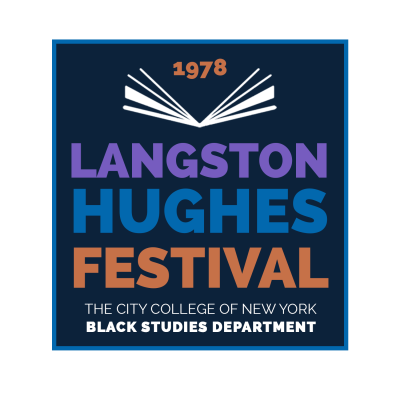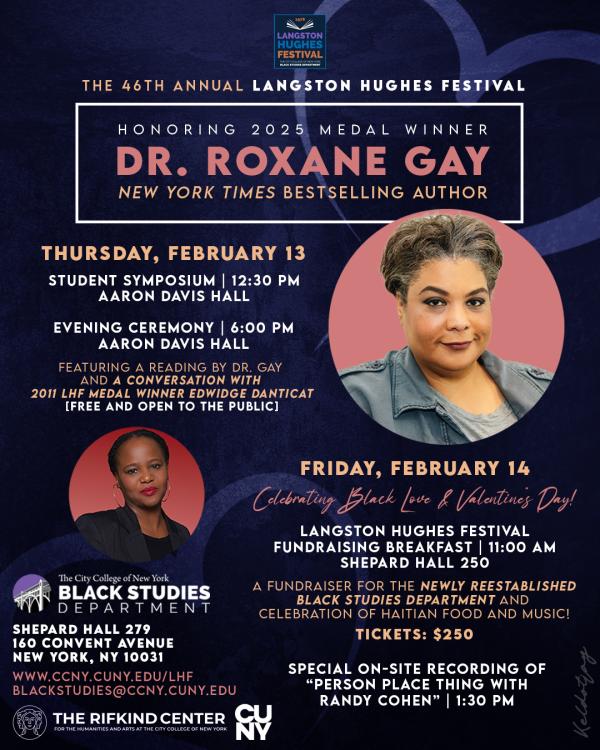Welcome to The Langston Hughes Festival at
The City College of New York
"Hold fast to dreams. For if dreams die, life is a broken-winged bird that cannot fly."
Langston Hughes
Our Mission
The Langston Hughes Festival has been in existence since 1978. Its mission is to celebrate and expand upon the literary legacy of the poet laureate of Harlem, James Langston Hughes. We award the Langston Hughes Medal to the most distinguished writers associated with the African diaspora. The medal is presented as the culmination of a day of salons, scholarly conferences and symposia in celebration of the legacy of Langston Hughes, as well as a creative performance in tribute to the honoree and an interview of and reading by the honoree.
The Medal
The Langston Hughes Medal is awarded to highly distinguished writers from throughout the African American diaspora for their impressive works of poetry, fiction, drama, autobiography and critical essays that help to celebrate the memory and tradition of Langston Hughes. Each year, the LHF’s Advisory Committee reviews the work of major black writers from Africa to America whose work is accessed as likely having a lasting impact on world literature. Past award winners include James Baldwin, Gwendolyn Brooks, Toni Morrison, August Wilson, Wole Soyinka, Derek Walcott, Octavia Butler, and Edwidge Danticat. Writers selected for this award receive the Langton Hughes Medal, an honorarium and an invitation to attend the Langston Hughes Festival Award Ceremony in the Marian Anderson Theatre at Aaron Davis Hall at The City College of New York in Harlem.
About Langston Hughes
James Mercer Langston Hughes (1902-1967) rose to become a major American poet and central figure of the Harlem Renaissance. He lived in and traveled to many places including Africa, Mexico, France and Asia. Upon the publication of his first volume of poetry, The Weary Blues (1926), Hughes inaugurated a tradition of poetry inflected with the Afrocentric rhythms and tonalities of blues and jazz, and remained dedicated to the depiction of urban African American folk life. Hughes also wrote plays, a novel, two autobiographies and newspaper columns. Known as a pioneer of blues and jazz poetry, Hughes modeled himself as a poet as activist and is celebrated as such around the world.
2025 Langston Hughes Festival Information
In 2025, The City College of New York (CCNY) will bestow The Langston Hughes Festival Medal upon New York Times bestselling author Roxane Gay.
2025 LANGSTON HUGHES FESTIVAL SCHEDULE OF EVENTS
Thursday, February 13, 2025, 12:30pm, Aaron Davis Hall, Student Symposium
The 46th Annual Langston Hughes Festival commences Thursday, February 13, 2025 with a Student Symposium at 12:30pm in Aaron Davis Hall. The Student Symposium will create a vibrant and interdisciplinary space where students can explore the resonances between Hughes’ and Gay’s writings, addressing themes such as race, gender, queer sexualities, migration, cultural erasure, poverty, Harlem and its communities, the environment, the New Negro or Harlem Renaissance, and Haiti and its diaspora. The Student Symposium is free to attend.
RSVP for the Student Symposium
Thursday, February 13, 2025, 6:00pm, Aaron Davis Hall, Evening Ceremony Honoring Roxane Gay
The Evening Ceremony, Thursday, February 13, 2025 at 6:00pm in Aaron Davis Hall will include a reading by Roxane Gay, and she will be joined in conversation by Edwidge Danticat, the 2011 Langston Hughes Festival Recipient. The Evening Ceremony is free to attend.
RSVP for the Evening Ceremony with Roxane Gay
Friday, February 14, 2025, 11:00am, Shepard Hall, Valentine's Day Breakfast Fundraiser
This year's Festival will also celebrate the reestablishment of the Black Studies Department at CCNY with a Valentine's Day Fundraising Breakfast in honor of Hughes and Black Studies. Join us as we celebrate Langston Hughes and Black Studies during The Langston Hughes Valentine's Day Fundraising Breakfast, Friday, February 14, 2025, at 11:00am in Shepard Hall.
Purchase Valentine's Day Breakfast Fundraiser Tickets: $250
Acknowledgements
The Langston Hughes Festival is made possible through the support of The Black Studies Department, The Division of Humanities and Arts, and the Simon Rifkind Center for the Humanities.

